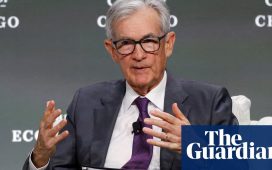Jeremy Hunt ‘will cut national insurance by 2p in the budget’
Back in the political world, Steven Swinford of The Times reports that tomorrow’s budget will include a national insurance cut of two percentage points.
A 2p in the pound reduction will cost an estimated £10bn, he reports.
EXCLUSIVE:
Jeremy Hunt will cut national insurance by 2 per cent in the Spring Budget tomorrow
It will cost £10bn and be worth £450 for the average worker. He will sell it as £900 worth of tax cuts when combined with 2 per cent NI cut in Autumn Statement
As per @SamCoatesSky…
— Steven Swinford (@Steven_Swinford) March 5, 2024
That would take up most of the £13bn in fiscal headroom which the chancellor is thought to have to spend, and still have debt falling as a share of GDP in five years’ time.
Our Politics Live blog has all the latest from Westminster:
Key events
Closing summary
Time for a recap.
Jeremy Hunt is to cut national insurance by 2p in his budget on Wednesday, the Guardian understands, in a move designed to offer voters a pre-election giveaway but which could mean steeper spending cuts after the election.
The UK chancellor is preparing to announce the second big cut to employment taxes in a year, after his decision to cut national insurance rates by 2p at last year’s autumn statement.
Wednesday’s move should save the average earner £450 a year, which combined with last year’s cut will add up to £900. However, the chancellor has been looking at further public spending cuts after the election as one way to pay for the tax reduction, despite economists’ warnings that such a move would cause public services to buckle.
Hunt and the prime minister, Rishi Sunak, have spent the last few weeks looking for ways to offer a tax cut on the scale of that announced last year as a way to boost the Conservatives’ flagging poll ratings in their last budget before an election.
The chancellor is also expected to freeze fuel duty, again.
In other news..
A swathe of major tech platforms are experiencing problems today, with Facebook and Instagram experiencing severe issues and Google hit by login problems.
Bitcoin has climbed to a new alltime high, trading over $69,000 for the first time, before slipping back.
UK car sales were their highest for any February in 20 years last month, driven by increased sales to businesses.
And there are hopes that the UK economy has ‘turned a corner’ and is exiting recession, after a pick-up in private sector growth last month.
But retail sales were soggy last month, as bad weather kept consumers away from the shops.
Here’s the rest of today’s news:
Tech platforms hit by outages
In the tech world, users are reporting problems accessing a range of services including Meta‘s Facebook, Messenger and Instagram platforms.
Technical problems are preventing users worldwide from accessing the social media platforms.
Users are also reporting problems accessing Google services, such as YouTube, and also flagging problems with Microsoft’s Teams….
Facebook, Instagram, Youtube, Google, Google Play and Whatsapp appear to be down for thousands of users.
— Kevin Nimmock (@KevinNimmock) March 5, 2024
Looking back at the UK budget tomorrow….The Institute for Fiscal Studies have said a 2p cut in national insurance will not prevent the tax take rising to record highs, at around 37% of GDP by 2028-29.
The Chancellor will reportedly announce a 2p cut to National Insurance contributions in tomorrow’s Budget.
Based on forecasts from last autumn, that tax cut would not – by itself – be enough to prevent taxes as a share of GDP from rising to record levels in 2028-29. pic.twitter.com/NQLqdl3aAr
— Institute for Fiscal Studies (@TheIFS) March 5, 2024
The main rate of National Insurance contributions rose for decades and reached 13.25% in Oct 2022 (remember we were going to have a health and social care levy…).
It’s now 10%. Speculation is for a cut to 8% in April.
A striking change pic.twitter.com/qZE2x4ZPTA
— Helen Miller (@HelenMiller_IFS) March 5, 2024
They also show the impact of more than a decade of freezes to fuel duty:
Another freeze to fuel duties, and the continuation of the 5p cut introduced in Spring 2022, would leave them 40% lower than the 2010 rate in real terms.
Doing this would cost the Exchequer around £4 billion next year. pic.twitter.com/ASoZPuqWyi
— Institute for Fiscal Studies (@TheIFS) March 5, 2024
Gold also hits record high today
Bitcoin’s supporters sometimes describe it is ‘digital gold’.
And today’s record high comes just a few hours after actual gold also hit a record high.
The spot price of gold traded as high as $2,141 per ounce today,
AJ Bell investment director Russ Mould says gold is benefiting from increases in government debt around the globe, but particularly in the USA.
“It is unfashionable to focus on gold, especially when the Magnificent Seven are doing so much to propel US equities to new highs (or at least five of them are, anyway), and it is easy to dismiss the case for including the precious metal in even the most balanced of portfolios.
As Warren Buffett succinctly put it in a speech he gave at Harvard in 1998, ‘Gold gets dug out of the ground in Africa, or someplace. Then we melt it down, dig another hole, bury it again and pay people to stand around guarding it. It has no utility. Anyone watching from Mars would be scratching their head.’
“Yet, unusually, the market is shrugging off the Sage of Omaha’s words of wisdom and embracing gold instead. Its rise to new highs even means that in capital terms it has matched strides with the much more widely lauded S&P 500 index since the start of 1971, the year when President Richard M. Nixon withdrew America from the gold standard and pulled down the curtain on the Bretton Woods monetary system that had prevailed since the end of the Second World War. This nugget of data may give a warm glow to gold bugs.
BREAKING: #Bitcoin has officially hit a new all time high for the first time since November 10th, 2021.
Bitcoin is now up 331% from its 2021 low and nearly 60% in 2024.
The total cryptocurrency market cap is now $2.6 trillion, the highest since December 2021.
As we push into… pic.twitter.com/RnsxhKFPcw
— The Kobeissi Letter (@KobeissiLetter) March 5, 2024
It’s incredible to think of how far crypto has come.
From the collapse of FTX, to a multi-year bear market, to intense regulatory scrutiny, #Bitcoin has seen it all.
Yet, here we are at new all time highs.
Follow us @KobeissiLetter for real time analysis as this develops.
— The Kobeissi Letter (@KobeissiLetter) March 5, 2024
Bitcoin didn’t spent terribly long at its record high – it’s now slipped back to $68k….
Bitcoin hits record high over $69,000
Newsflash: Away from the budget speculation, bitcoin has just hit a new alltime high.
The price of the world’s largest crypto currency just traded over $69,000, above the previous record set in November 2021.
It just hit $69,202.
Today’s rally means bitcoin has gained around 65% since the start of 2024, and almost 170% over the last six months.
Recent gains have been driven by the launch of bitcoin EFTs (exchange traded funds) by major asset managers, which make it easier to invest money in bitcoin.
Those ETFs have seen large inflows from investors, creating more buying pressure.
Amazing correlation between ETF inflows and #Bitcoin green daily candles. We have seen significant green daily candles last week on Monday, Tuesday and Wednesday, and yesterday. In each of those four days the Total Net Inflow was above $500m.
Another proof of the importance of… pic.twitter.com/1BfT9NfzeM
— Alessandro Ottaviani (@AlexOttaBTC) March 5, 2024
One potential option discussed by Tory MPs would be for Hunt to cut national insurance by 1p and also cut income tax by 1p, the Financial Times reports.
That would have a combined cost of about £12bn; more than the £10bn for lopping 2p off national insurance,.
The attraction is that voters might appreciate a cut to income tax rather than national insurance (which is a tax on earned income).
I’ve done hundreds or thousands of vox pops during my journalistic career and no one has ever mentioned the headline rate of NI, not once https://t.co/p0DpGzWQTB
— Jim Pickard 🐋 (@PickardJE) March 5, 2024
But one government insider insisted that Hunt would not announce income tax cuts on Wednesday, the FT adds. More here.
The Resolution Foundation have crunched the numbers, and show that those earning £50,000 or more would gain the most from another 2p cut in national insurance.
But, they point out, those earning less than £19,000 will be worse off overall, due to the impact of threshold freezes.
What would a fresh employee National Insurance 2p rate cut mean for personal taxes in the election year? 🧵https://t.co/FaISSh2dPp
— Resolution Foundation (@resfoundation) March 5, 2024
That depends how much you earn…
💸 The biggest cash gains would go to those on £50,000 (net gain of £1,200 each year)
👛 If you earn below £19,000, you’d be worse off overall since you lose more from threshold freezes than you’d gain from rate cuts pic.twitter.com/5M8h5vnmj3
— Resolution Foundation (@resfoundation) March 5, 2024
And how would this cut sit alongside *all* personal tax changes announced in this parliament?
💸 People earning £27,000-59,000 are better off overall
💷 Higher earners are worse off overall by £500
🪙 Someone on £16,000 would be the worst affected proportionally pic.twitter.com/mpQmRhiGaf
— Resolution Foundation (@resfoundation) March 5, 2024
Adam Corlett, principal economist at the Resolution Foundation, explains that tax cuts this year are ‘sandwiched’ between rises earlier in this parliament, and likely increases in the next one:
“There are huge questions about whether Britain can really afford £20bn of tax cuts this year, given the insufficient outlook for public spending and the need to reduce our national debt.
“But the Chancellor has at least opted for a better approach than cutting income tax rates – prioritising workers who face higher tax rates than landlords and pensioners.
“But, while this is going to be a tax-cutting election year, it is sandwiched between significant past and future tax rises, with the Budget likely to only add to the number of tax increases coming in after the election.”
NI cut would be more like a ‘tatty-looking ferret’ than a rabbit
Even if national insurance rates are cut tomorrow, many workers would still face being dragged into paying income tax, or paying it at the higher rate, due to the freeze on income tax thresholds.
That freeze is causing significant ‘fiscal drag’, as rising wages push more people into tax higher bands.
Sarah Coles, head of personal finance at Hargreaves Lansdown, says:
“Reports suggest Jeremy Hunt has decided to cut National Insurance by 2p in the Budget. It wouldn’t be so much a rabbit pulled out of a hat as a slightly tatty-looking ferret dragged from a box, labelled ‘rabbit’. An income tax cut has been discussed for well over a year. A National Insurance cut would be far better than nothing, but it would be a scaled-down, less attractive option. Jeremy Hunt would just have to hope it didn’t bite.
With taxes swallowing such a massive proportion of GDP, any tax cut would be welcome. This one would save us an average of £450 a year. And while the biggest savings would be reserved for those earning more, every saving helps at a time when our own budgets are stretched so thin.
t’s easy to see why this may have pipped income tax to the post in the race for Budget tax cuts, because it’s much cheaper. A 2p cut would cost about £10 billion, which is more manageable for a Chancellor with shrinking headroom. However, the price Hunt would pay for opting for NI is clear. It would benefit fewer people. 27 million workers would pocket a tax cut, but millions more wouldn’t, because it wouldn’t affect the tax on pensions, and income from savings and investments like property. It means an awful lot of voters would get no benefit from the change.
Full marks, @HLInvest “Reports suggest Jeremy Hunt has decided to cut National Insurance by 2p in the Budget. It wouldn’t be so much a rabbit pulled out of a hat as a slightly tatty-looking ferret dragged from a box, labelled ‘rabbit’”
— This writing business. Overrated if you ask me. (@ScouseView) March 5, 2024
Coles also points out that January’s cut to National Insurance hasn’t made a dramatic difference in the polls:
It may be that Jeremy Hunt has decided this is all he can afford to offer right now. The question will be whether it’s a enough of a blockbuster tax cut to move the dial on a general election.
Unfortunately, if NI is cut, it’s not as good as it may sound, because it would come at the same time as yet another freeze in the personal allowance and the higher rate tax threshold, which the OBR says will see 1.1 million more people dragged into paying income tax and 800,000 more forced to pay higher rate tax. It means the government would be giving with one hand and taking away with the other.”
King Charles and Jeremy Hunt pictured together ahead of Budget
The King has held an in-person pre-Budget audience with Jeremy Hunt at Buckingham Palace today, ahead of tomorrow’s fiscal event.
It’s traditional that before a Budget is presented, the Chancellor of the Exchequer meets with the monarch, usually the day before the Government’s plans for the economy are delivered in a statement to the Commons (at 12.30pm tomorrow).
Sky News are also reporting that the chancellor will cut national insurance by a further 2p in the pound in the budget tomorrow.
Their political correspondent, Matthew Thompson, says a debate has been “raging” inside Downing Street for the last few weeks about whether to cut NI rates or income tax.
There are two reasons why NI has been chosen, Thompson says.
One, it’s cheaper, as only paid by those in work, not those who are retired.
Two, this meant is is less inflationary.
But, he adds, an income tax cut is potentially the better option politicially, as people understand it more.
There is a fear within the government that they may not get “the political dividends they’re looking for” through a NI cut, Thompson adds – after all, Hunt announced a 2p cut in the autumn statement, and the Conservatives are still lagging well behind in the polls.
Yahoo Finance have details on what a 2 percentage point cut to national insurance would mean in practice:
Employees and self-employed workers currently pay 10% on earnings between £12,570 and £50,270 in Class 1 national insurance contributions.
This was reduced from 12% of earnings in the autumn statement, although the threshold to start paying — £12,570 — is frozen until 2028.
Analysis by the investment platform AJ Bell reveals that cutting the national insurance rate by two percentage points from 10% to 8% would be worth almost £250 to someone on a yearly salary of £25,000, with a maximum saving of £754.
Rachael Griffin, tax and financial planning expert at City firm Quilter, says:
It looks like Chancellor Jeremey Hunt has opted for the cheaper and potentially less headline grabbing option of cutting national insurance by a further 2%. This means that millions of hard-working Britons will see more money in their pockets every month, as the government tries to ease the pressure of the highest tax burden in decades. While a cut in taxes will for some be a needed boost, it hardly turns the dial much considering we are dealing with a historic tax burden at present. However, it will certainly be a crowd pleaser with someone earning £30,000 a year being around £58 better off a month if you also take into account the national insurance cuts in the Autumn Statement. However, many people don’t understand how national insurance works and a cut to income tax would have been easier for all to understand but crucially much more expensive
After the budget tomorrow, the Office for Budget Responsibility will give its verdict, alongside its latest forecasts for economic growth, borrowing, inflation and unemployment.
Economists predict a slightly downgrade to the OBR’s short-term growth prediction, PA Media reports.
In its previous forecast in November, the OBR had predicted 0.6% growth in GDP for 2023, with 0.7% growth in 2024.
However, last year the UK economy ultimately fell short of this, with 0.1% growth in GDP, according to the Office for National Statistics (ONS).
This was lower than expected after a contraction over the final half of 2023, which also meant the UK was in a technical recession.
Economists expect the UK to swiftly return to growth after the recession but widely predict subdued growth in 2024, with projections below the OBR’s previous forecast.
Experts at Pantheon Macroeconomics and Oxford Economics are both expecting 0.4% growth in 2024.
Pantheon said it expects lower-than-expected growth to cut tax revenues by around £4bn this year, although this is expected to dissipate over the next five years.
UK government bond prices are strengthening today, an indication that City traders are not too anxious about tomorrow’s budget.
This is pushing down the yield, or interest rate, on UK 10-year bonds (yields fall when bond prices rise, and vice versa).
*UK BONDS LEAD GAINS ACROSS MAJOR PEERS; 10-YEAR YIELD DOWN 7BPS
— Max HarryHindsight Capital (@MaxDrake007) March 5, 2024
Bond investors will be hoping that any tax cuts are ‘funded’, either through other tax increases or through spending cuts, rather than requiring additional borrowing.









